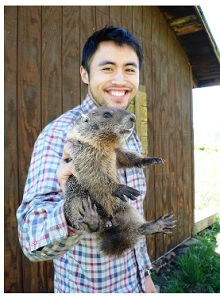The Biology of Climate Change: The effects of a changing climate on migrating and over-wintering species at a high-elevation field station (Version 1.0)
By Carrie Wu and Amy Ellwein

An undergraduate summer research student holds a yellow-bellied marmot that was trapped at RMBL. (Photos courtesy of RMBL)
Module Description:
Students engage with long-term environmental and phenology data sets (spanning over 40 years) collected at the Rocky Mountain Biological Laboratory, a high-elevation field station in Colorado, to explore the effects of climate change on the phenology of migrating and hibernating species. After becoming familiar with the geographic context, people involved with data collection, and organisms studied through background readings and videos, students explore the raw data set in Excel and/or using an interactive data visualization tool. In small groups, students reproduce figures and regressions from Inouye et al. (2000) based on those data, then expand their analyses with data collected during the subsequent decade. By comparing analyses that encompass different time spans, students evaluate the original interpretations from Inouye et al. (2000), explain possible discrepancies, and generate predictions for future patterns. Finally, students build upon their initial analyses by developing and testing hypotheses about patterns found in other organisms in the data set, and combine these to discuss the ecological consequences of shifting plant and animal phenology in group presentations.
The authors thank billy barr and David Inouye for contributing data to this module, numerous RMBL scientists for their work on the Digital RMBL web site, and participants in the 2017 QUBES DIG into Data Faculty Mentoring Network for support and valuable discussions.
Teaching Setting:
This resource, which consists of a 3-hour lab activity and associated pre- and post-lab assignments, can be implemented in a variety of biology or ecology courses. Students should have some background knowledge about phenology, species interactions, and climate sensitivity. Students will also benefit from having a basic understanding of graphing, figure formatting, and regression analysis.
QUBES Citation:
Wu, C., Ellwein, A. (2018). The Biology of Climate Change: The effects of a changing climate on migrating and over-wintering species at a high-elevation field station. DIG into Data FMN (2017), QUBES Educational Resources. doi:10.25334/Q4X696
|